Michael Fayer surveys the world around him and sees something that most of us do not: chemistry. It’s not that Fayer, a professor of chemistry, sees no value in anything but academic chemistry research. It’s just that when it comes down to it, chemistry has more to do with ordinary human experience than any other field. To Fayer, everything from color to nutrition to the greenhouse effect is, first and foremost, chemistry.
“Chemistry just permeates our lives,” he said.
He is not alone in this view. For Noah Burns, it is the basis of life. For Laura Dassama, it is the path to advances in health. And for Hemamala Karunadasa, chemistry is the foundation of civilizations. Chemists call their discipline “the central science” for a reason, because it touches everything in our daily lives. Here, Fayer, Burns, Dassama and Karunadasa share how they got into chemistry, the joys and frustrations of their academic lives and what chemistry, the central science, means to them.
Fayer is the David Mulvane Ehrsam and Edward Curtis Franklin Professor in Chemistry. Burns is an assistant professor of chemistry and a member of Stanford ChEM-H. Dassama is an assistant professor of chemistry and an Institute Scholar of ChEM-H. Karunadasa is an assistant professor of chemistry and a Center Fellow of the Precourt Institute for Energy.
Photographs by L.A. Cicero
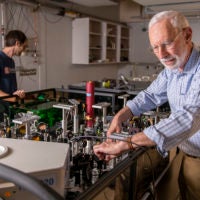
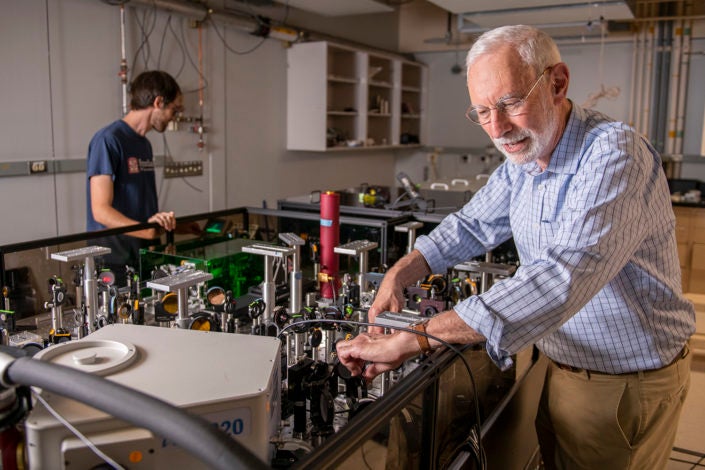
Michael Fayer
Fayer came to Stanford in 1974 and was elected to the National Academy of Sciences in 2007. Here, he explains why chemistry interests him more than black holes, why chemists call it the central science and what it’s actually like in a chemistry lab. (Hint: There’s a lot of plumbing.)
“It doesn’t matter what it is, if it affects you in daily life, it’s molecules and atoms. And understanding these things from antibiotics to microelectronics, those are the areas of science that count on Earth in our daily lives.”
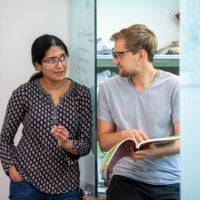
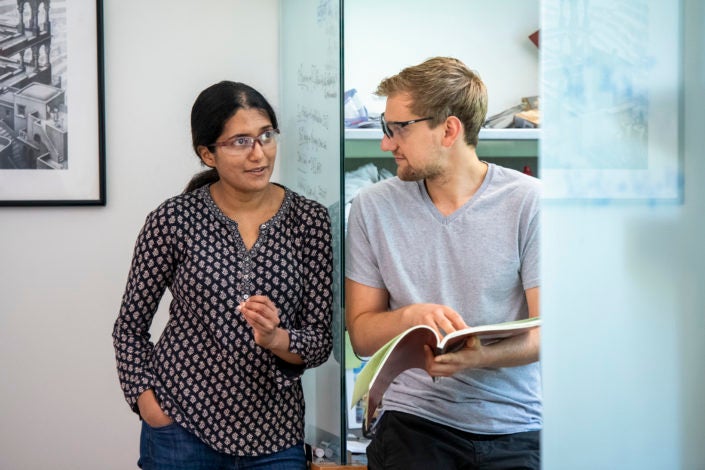
Hemamala Karunadasa
Karunadasa joined the Department of Chemistry in 2012 and built a lab centered on developing materials for clean energy. She spoke about how she – slowly – came to love chemistry, how molecules define civilizations and the need to show others what life as a scientist is really like.
“If you think back, materials have defined civilizations, right? We went from the Stone Age to the Bronze Age to the Iron Age, and it’s very exciting to think, what’s the material that will define our future?”
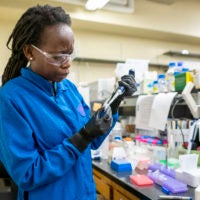
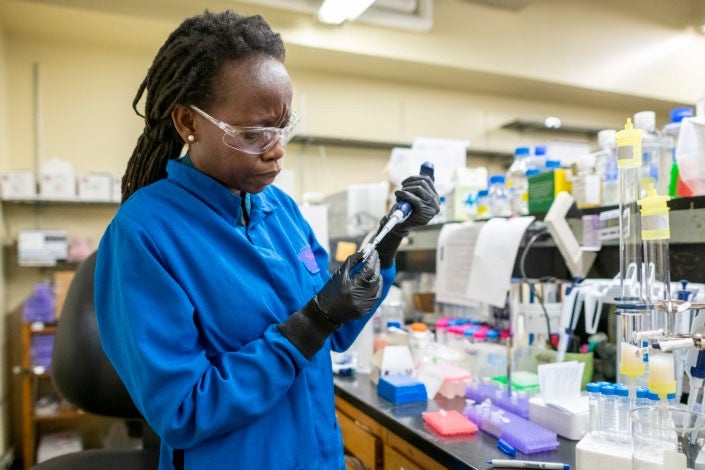
Laura Dassama
Dassama joined the Stanford faculty just last year. She spoke about coming to chemistry after assuming, like many chemists, she would be a doctor, how launching a new lab is like starting a new business and how she sees the world – even health – in terms of molecules.
“I was interested in human health, but I really wanted to understand the nitty-gritty details. Chemistry gave me satisfaction because it was focused on molecular-level understanding. I thought, ‘That’s what I need to be doing.’”
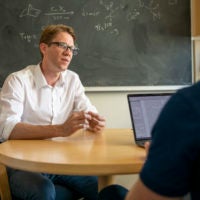
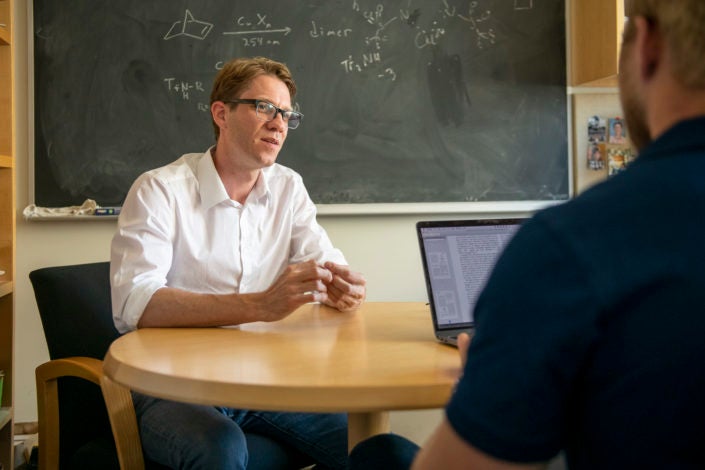
Noah Burns
Burns has been at Stanford since 2013 and focuses on molecules called natural products. He spoke about the romantic, even artistic side of doing chemistry, the curiosity that drives him and how it’s the people around him that make the endeavor worthwhile.
“It’s hard work. It’s not construction, but it is labor. It’s the human aspect of it that makes it. It’s mentoring students, it’s the joy of discovery and experiencing that as a community. It’s a gift. I feel so lucky that I can do that.”
Michael Fayer

Professor Michael Fayer, right, works with graduate student David Hoffman. (Image credit: L.A. Cicero)
Fayer has spent nearly his entire career as a physical chemist at Stanford, starting as an assistant professor in 1974. Much of his current research focuses on systems that are neither small nor large – for instance, water confined in tiny tubes, where neither the rules of individual molecules nor bulk liquids apply. Here, he reflects on the most interesting physics there is, why chemistry is actually mostly plumbing and his strategy for finding promising students – it’s not asking about how much they love chemistry.
“I’ve been at Stanford for 45 years. I published my first paper in ’68, so that’s 51 years ago. That’s getting to be a little while.
“What I do, physical chemistry, is basically the physics of interesting chemical systems, which is the most important physics there is. You’ve got astrophysics, which is the physics of very large objects, stars, galaxies and the universe. It’s really exciting, complicated, interesting. You study black holes and things like that. If you know everything there is to know about a black hole, it will change absolutely nothing on Earth or in people’s daily lives. And then there’s particle physics, things like quarks and Higgs bosons. If you know everything about them, it’ll change absolutely nothing for people and life on Earth.
“And then there’s the physics of molecules and atoms and materials formed from them. And that’s where everything in our daily lives comes from. Whether it’s making the semiconductor chips that run your cell phone, understanding climate change or learning about DNA to cure genetic diseases. Whatever material you’ve got on Earth, it doesn’t matter what it is, if it affects you in daily life, it’s molecules and atoms. And understanding these things from antibiotics to microelectronics, those are the areas of science that count on Earth in our daily lives.
“That’s why we call chemistry the central science, because all of biology is based on chemistry, all of materials science is based on chemistry. Whatever you experience that really affects human existence is dependent on chemistry. Everything else that’s of importance branches off from it. Everything. Chemistry just permeates our lives.
“I tell my students, 50 percent of physical chemistry is plumbing. I’m serious. We have more trouble with water systems, coolers for lasers, the pumps. The hoses break. I’m a pretty good glass blower. When my students need to actually do some chemistry, I go and help. We’ve got a torch and glass and stuff like that. We build circuits. I have to teach some of my students how to solder. And so whatever it is, we do it, including plumbing. Everything from statistical mechanics theory to literally plumbing. We do it, and I pride myself on being able to do all of these things.
“I used to ask people – I still do but it’s not as useful – I’d say, ‘Well, when you were a kid, did you have any hobbies? What did you like to do?’ And one of my first students said, ‘Oh, I liked to race slot cars.’ ‘Oh, race slot cars?’ And then he went on to say, ‘Yeah, I used to build them. I used to have this little lathe. I’d machine these parts and I’d wind my own motors because I could make them lighter and faster.’ I said, ‘You’re my guy!’ It’s not that making slot cars has anything to do with chemistry. But it’s that mindset of I’m going to do it better, I’m going to do it myself, I’m going to figure out how to do it – that’s what makes a great chemist.”
Michael Fayer

Professor Michael Fayer, right, works with graduate student David Hoffman. (Image credit: L.A. Cicero)
Fayer has spent nearly his entire career as a physical chemist at Stanford, starting as an assistant professor in 1974. Much of his current research focuses on systems that are neither small nor large – for instance, water confined in tiny tubes, where neither the rules of individual molecules nor bulk liquids apply. Here, he reflects on the most interesting physics there is, why chemistry is actually mostly plumbing and his strategy for finding promising students – it’s not asking about how much they love chemistry.
“I’ve been at Stanford for 45 years. I published my first paper in ’68, so that’s 51 years ago. That’s getting to be a little while.
“What I do, physical chemistry, is basically the physics of interesting chemical systems, which is the most important physics there is. You’ve got astrophysics, which is the physics of very large objects, stars, galaxies and the universe. It’s really exciting, complicated, interesting. You study black holes and things like that. If you know everything there is to know about a black hole, it will change absolutely nothing on Earth or in people’s daily lives. And then there’s particle physics, things like quarks and Higgs bosons. If you know everything about them, it’ll change absolutely nothing for people and life on Earth.
“And then there’s the physics of molecules and atoms and materials formed from them. And that’s where everything in our daily lives comes from. Whether it’s making the semiconductor chips that run your cell phone, understanding climate change or learning about DNA to cure genetic diseases. Whatever material you’ve got on Earth, it doesn’t matter what it is, if it affects you in daily life, it’s molecules and atoms. And understanding these things from antibiotics to microelectronics, those are the areas of science that count on Earth in our daily lives.
“That’s why we call chemistry the central science, because all of biology is based on chemistry, all of materials science is based on chemistry. Whatever you experience that really affects human existence is dependent on chemistry. Everything else that’s of importance branches off from it. Everything. Chemistry just permeates our lives.
“I tell my students, 50 percent of physical chemistry is plumbing. I’m serious. We have more trouble with water systems, coolers for lasers, the pumps. The hoses break. I’m a pretty good glass blower. When my students need to actually do some chemistry, I go and help. We’ve got a torch and glass and stuff like that. We build circuits. I have to teach some of my students how to solder. And so whatever it is, we do it, including plumbing. Everything from statistical mechanics theory to literally plumbing. We do it, and I pride myself on being able to do all of these things.
“I used to ask people – I still do but it’s not as useful – I’d say, ‘Well, when you were a kid, did you have any hobbies? What did you like to do?’ And one of my first students said, ‘Oh, I liked to race slot cars.’ ‘Oh, race slot cars?’ And then he went on to say, ‘Yeah, I used to build them. I used to have this little lathe. I’d machine these parts and I’d wind my own motors because I could make them lighter and faster.’ I said, ‘You’re my guy!’ It’s not that making slot cars has anything to do with chemistry. But it’s that mindset of I’m going to do it better, I’m going to do it myself, I’m going to figure out how to do it – that’s what makes a great chemist.”
Hemamala Karunadasa

Assistant Professor Hemamala Karunadasa in her lab with graduate student Nathan Wolf
Karunadasa grew up in Colombo, Sri Lanka, where she had assumed she would study to become a doctor. On a last-minute whim, she applied to schools in the United States and ended up going to Princeton University, where – slowly, half-heartedly – she discovered chemistry. Today, she is a materials chemist laying the groundwork for new clean energy technologies. She spoke about how she came to love chemistry, how materials define civilizations and the need to explain to young scientists – especially young women – what a career in science actually looks like.
“So, the truth be told, I picked my major based on elimination. I basically said, I don’t like this, I don’t like that, and I was left with chemistry. I wasn’t very excited, but I figured, eh, I can do it.
“And then as part of a major, you had to do research. I met this professor and he pitched this project to me and I thought it sounded really cool. I didn’t completely understand everything he was saying, but I left that meeting thinking, this guy loves his life so much. He is so excited about his work. I want to feel whatever it is that guy is feeling. I want his life. I want to be that excited about my work. So I didn’t pick that topic. I wanted to work with that guy. I think that is the day that changed my life.
“We are materials chemists. That means we make new compositions of matter. I guess the overarching goal is to say, can we put these specific atoms in this arrangement? Can we put the atoms where we want in a crystal? Do we know what arrangement we want in order to get this specific property? All of my research teams revolve around clean energy technology, so the properties we seek are things like, can this material absorb sunlight? Can it produce current? Can a material absorb UV light and then emit light that we can see with the eye?
“If you think back, materials have defined civilizations, right? We went from the Stone Age to the Bronze Age to the Iron Age, and it’s very exciting to think, what’s the material that will define our future? I think it’s pretty clear that it’s going to be artificial. We dug iron out from the earth, but the materials that we need in the future are probably going to be something that we have to make. So, are we ready to make these materials?
“Our goals are not extremely near term. I’m not working on any material, any product that will end up on a shelf within the next five years. But I think the work we do will set the stage for broader future technologies. I mean, a room temperature superconductor would change our civilization. It’s very far in the future, but someone needs to set the groundwork. So I don’t particularly care whether this thing will be realized in my lifetime. I think it’s just incredibly cool to at least set the stage for something really great.
“Recently I’ve been thinking about why people pick this profession and why people don’t, and I’ve just been wondering why aren’t there more women applying for this job, even though the search committees are desperately waiting for a female applicant.
“It really seems to me like people just don’t know what this job is. They assume that someone who does this has everything figured out and we always knew what to do, because whenever you present a research talk, everything is perfect. You’d never show the craziness before you figured everything out. And I think this is actually a disservice. It’s important to tell students that no one prepares you for this job. You learn along the way, and all you really need is a genuine want to do it. It’s not like I am the smartest in my class. I never was, but I really wanted this.
“I talked to a student, and she basically said, ‘You know, it cannot be my whole life.’ These are all misconceptions: that we don’t have a life, that you have to make too many sacrifices. It is important for students to know that young faculty have lives. We have partners, we have children, we have jobs where we can work on anything we want. We really love our life.”
Hemamala Karunadasa

Assistant Professor Hemamala Karunadasa in her lab with graduate student Nathan Wolf
Karunadasa grew up in Colombo, Sri Lanka, where she had assumed she would study to become a doctor. On a last-minute whim, she applied to schools in the United States and ended up going to Princeton University, where – slowly, half-heartedly – she discovered chemistry. Today, she is a materials chemist laying the groundwork for new clean energy technologies. She spoke about how she came to love chemistry, how materials define civilizations and the need to explain to young scientists – especially young women – what a career in science actually looks like.
“So, the truth be told, I picked my major based on elimination. I basically said, I don’t like this, I don’t like that, and I was left with chemistry. I wasn’t very excited, but I figured, eh, I can do it.
“And then as part of a major, you had to do research. I met this professor and he pitched this project to me and I thought it sounded really cool. I didn’t completely understand everything he was saying, but I left that meeting thinking, this guy loves his life so much. He is so excited about his work. I want to feel whatever it is that guy is feeling. I want his life. I want to be that excited about my work. So I didn’t pick that topic. I wanted to work with that guy. I think that is the day that changed my life.
“We are materials chemists. That means we make new compositions of matter. I guess the overarching goal is to say, can we put these specific atoms in this arrangement? Can we put the atoms where we want in a crystal? Do we know what arrangement we want in order to get this specific property? All of my research teams revolve around clean energy technology, so the properties we seek are things like, can this material absorb sunlight? Can it produce current? Can a material absorb UV light and then emit light that we can see with the eye?
“If you think back, materials have defined civilizations, right? We went from the Stone Age to the Bronze Age to the Iron Age, and it’s very exciting to think, what’s the material that will define our future? I think it’s pretty clear that it’s going to be artificial. We dug iron out from the earth, but the materials that we need in the future are probably going to be something that we have to make. So, are we ready to make these materials?
“Our goals are not extremely near term. I’m not working on any material, any product that will end up on a shelf within the next five years. But I think the work we do will set the stage for broader future technologies. I mean, a room temperature superconductor would change our civilization. It’s very far in the future, but someone needs to set the groundwork. So I don’t particularly care whether this thing will be realized in my lifetime. I think it’s just incredibly cool to at least set the stage for something really great.
“Recently I’ve been thinking about why people pick this profession and why people don’t, and I’ve just been wondering why aren’t there more women applying for this job, even though the search committees are desperately waiting for a female applicant.
“It really seems to me like people just don’t know what this job is. They assume that someone who does this has everything figured out and we always knew what to do, because whenever you present a research talk, everything is perfect. You’d never show the craziness before you figured everything out. And I think this is actually a disservice. It’s important to tell students that no one prepares you for this job. You learn along the way, and all you really need is a genuine want to do it. It’s not like I am the smartest in my class. I never was, but I really wanted this.
“I talked to a student, and she basically said, ‘You know, it cannot be my whole life.’ These are all misconceptions: that we don’t have a life, that you have to make too many sacrifices. It is important for students to know that young faculty have lives. We have partners, we have children, we have jobs where we can work on anything we want. We really love our life.”
Laura Dassama

Assistant professor of chemistry Laura Dassama in her lab.
Dassama works at the boundaries between chemistry and biology, and she is among the newest members of the faculty – she’s been on campus for just under a year. Right now, her lab comprises just herself, four undergrads and a postdoc. In addition to setting the direction of the lab, she still does many of its experiments as well as the work of lab manager – so far, there’s no one else to do it. Here, Dassama describes what it means to her to think like a chemist, why she settled on chemistry after assuming she’d become a physician and how running a new lab is a little like running a small business.
“Broadly, my lab is interested in using tools of chemistry to understand things in biology. More specifically, we’re interested in problems related to drug resistance. And so, we have projects that include identifying key players in drug resistance and attempting to understand how those work so that we can be able to target them specifically.
“It has been interesting, getting used to this new role. Prior to starting my lab, there was always someone else who ran the labs I had worked in, and I was only focused on my projects, which were a small part of the lab’s focus. Now here, not only am I in charge of the lab’s focus and making sure everyone’s science is running smoothly, I am also recruiting and managing people. Running a lab is very much like running a small business. One has to think about the finances, to make sure everything and everyone is healthy, that our ideas are good and that we are investing time and energy in the right projects.
“Growing up, I had a curiosity about diseases and why people got sick and how medications that were applied helped to make people feel better. And so at the time, it may still be the case where I grew up, in Liberia, if you were interested in science and math and you happened to be good at it, your only career option was to become a physician. And so I presumed that that’s what I would do and everyone presumed that’s what I would do.
“It was not until I went to college and described to some of my professors what I actually wanted to do that I realized that I could have a career in research. I realized that I could go to the lab and discover the molecular bases for diseases and the impact of medications. I had no idea prior to that that research was a viable and respectable career. So, at 20 years old, I went into the lab and discovered that it was exactly what I wanted to do.
“My mother is a nurse and my father a lawyer, and they always presumed I would be a physician. When I told them that I was planning to go to graduate school, they had no idea what that meant. It was a bit scary because they were worried that they would have to support me – financially – the rest of my life.
“Chemistry – I was interested in human health problems, but I really wanted to understand the nitty-gritty details, and chemistry gave me satisfaction because it was focused on molecular-level understanding of these very complex problems and systems, and I thought, ‘That’s what I need to be doing.’
“Even though I never officially got a degree in chemistry – my bachelor’s is in biochemistry because I wanted to maintain my interest in biological applications – I worked in a chemistry lab. Most of the tools I use are tools from chemistry and physics, and so even though none of my degrees are in chemistry, my work is chemistry, and I do think like a chemist. To me, it is as if I see the world in terms of its molecules. I am fascinated by the molecular makeup of things. When I think of a human disease, I do not think of only the physiological description of the disease. I always think of what drives it. I am curious about the molecules that are involved and how they work. Perhaps if we identified them and understood how they work, we could alter their workings.”
Laura Dassama

Assistant professor of chemistry Laura Dassama in her lab.
Dassama works at the boundaries between chemistry and biology, and she is among the newest members of the faculty – she’s been on campus for just under a year. Right now, her lab comprises just herself, four undergrads and a postdoc. In addition to setting the direction of the lab, she still does many of its experiments as well as the work of lab manager – so far, there’s no one else to do it. Here, Dassama describes what it means to her to think like a chemist, why she settled on chemistry after assuming she’d become a physician and how running a new lab is a little like running a small business.
“Broadly, my lab is interested in using tools of chemistry to understand things in biology. More specifically, we’re interested in problems related to drug resistance. And so, we have projects that include identifying key players in drug resistance and attempting to understand how those work so that we can be able to target them specifically.
“It has been interesting, getting used to this new role. Prior to starting my lab, there was always someone else who ran the labs I had worked in, and I was only focused on my projects, which were a small part of the lab’s focus. Now here, not only am I in charge of the lab’s focus and making sure everyone’s science is running smoothly, I am also recruiting and managing people. Running a lab is very much like running a small business. One has to think about the finances, to make sure everything and everyone is healthy, that our ideas are good and that we are investing time and energy in the right projects.
“Growing up, I had a curiosity about diseases and why people got sick and how medications that were applied helped to make people feel better. And so at the time, it may still be the case where I grew up, in Liberia, if you were interested in science and math and you happened to be good at it, your only career option was to become a physician. And so I presumed that that’s what I would do and everyone presumed that’s what I would do.
“It was not until I went to college and described to some of my professors what I actually wanted to do that I realized that I could have a career in research. I realized that I could go to the lab and discover the molecular bases for diseases and the impact of medications. I had no idea prior to that that research was a viable and respectable career. So, at 20 years old, I went into the lab and discovered that it was exactly what I wanted to do.
“My mother is a nurse and my father a lawyer, and they always presumed I would be a physician. When I told them that I was planning to go to graduate school, they had no idea what that meant. It was a bit scary because they were worried that they would have to support me – financially – the rest of my life.
“Chemistry – I was interested in human health problems, but I really wanted to understand the nitty-gritty details, and chemistry gave me satisfaction because it was focused on molecular-level understanding of these very complex problems and systems, and I thought, ‘That’s what I need to be doing.’
“Even though I never officially got a degree in chemistry – my bachelor’s is in biochemistry because I wanted to maintain my interest in biological applications – I worked in a chemistry lab. Most of the tools I use are tools from chemistry and physics, and so even though none of my degrees are in chemistry, my work is chemistry, and I do think like a chemist. To me, it is as if I see the world in terms of its molecules. I am fascinated by the molecular makeup of things. When I think of a human disease, I do not think of only the physiological description of the disease. I always think of what drives it. I am curious about the molecules that are involved and how they work. Perhaps if we identified them and understood how they work, we could alter their workings.”
Noah Burns

Assistant Professor Noah Burns with graduate student Carl Mansson (Image credit: L.A. Cicero)
Burns grew up in Maine exploring the forests around his home and wondering what life is. Today, he’s an organic chemist working to understand the construction of natural products, complex molecules produced by plants and animals. He talks about what he loves about doing organic chemistry, the struggles many assistant professors experience and the community that makes it worthwhile.
“What I love about organic chemistry is how visual and how spatial it is. In order to be good at it, you have to be able to see this three-dimensional object, a molecule. We make models a lot, but so much of it is being done in our heads, so I need to be able to translate 3D to 2D, back and forth, rotate things around in my mind. And then we make molecules, right? There’s a satisfaction in that, in doing stuff with your hands, and there’s a real aesthetic to it. My creative, sort of romantic side is captured by that, and I’m not an outlier in my field like that.
“My father was a family doctor and so I certainly thought about medicine, but then I took organic chemistry and it was a real life-determining experience. Organic chemistry just sort of clicked for me. It made sense. Then that summer I got into a lab and started doing research, and that was the culmination of my epiphany. Not only do I love the theory behind it and I love thinking about it, but now I’m actually doing it in the lab and I’m actually making new molecules with my own hands. And that was just like, ‘OK, this is it.’
“I’m really motivated by the fundamental questions of how the world works, how organic molecules work, how nature works. I mean, sure, I would love to contribute to putting a drug on the market that helps save lives. I think the chances of me doing that are very slim. I will say it does motivate me a lot to think that some people in the lab, they’re going to go work in the pharmaceutical industry, and to think that I’m helping train these people that are going to be making the drugs of the future, that’s pretty cool. But for me, it’s a genuine curiosity, an excitement of finding new chemistry, a new way to make a molecule, to control a reaction.
“It’s hard work. It’s not construction and heavy lifting, but it is labor. We’re mixing things together. We’re syringing this into here, we’re heating this up, we’re adding in this other reagent, we’re stopping this reaction, we’re transferring that to another vessel. That is what we’re doing with our hands, like all day.
“One thing about what we do, especially here at Stanford, is we’re trying to be at the top of our field. You’re doing research, you’re submitting papers, you’re submitting grants, and people can be very, very critical and that can be really tough. You know, you can read a lot of positive things and then you see one little negative thing and then it’s like, ‘Oh, this is horrible.’
“I had a period sort of midway into being an assistant professor where I really questioned whether I was going to continue with this or not. That was really hard. What was really helpful was some outside perspective from my partner and family and other friends at other schools, junior faculty that were going through the same thing. I got the sense that it was not this weird, unusual experience. One colleague in particular asked, ‘Do you think what you’re doing is important?’ and I said, ‘Yes.’ And he said, ‘Well, there you go.’ That was the shortest conversation and it was in a way the most helpful.
“It’s the human aspect of it that makes it. It’s mentoring students, it’s the joy of discovery and experiencing that as a community. It’s a gift. I feel so lucky that I can do that.”
Noah Burns

Assistant Professor Noah Burns with graduate student Carl Mansson (Image credit: L.A. Cicero)
Burns grew up in Maine exploring the forests around his home and wondering what life is. Today, he’s an organic chemist working to understand the construction of natural products, complex molecules produced by plants and animals. He talks about what he loves about doing organic chemistry, the struggles many assistant professors experience and the community that makes it worthwhile.
“What I love about organic chemistry is how visual and how spatial it is. In order to be good at it, you have to be able to see this three-dimensional object, a molecule. We make models a lot, but so much of it is being done in our heads, so I need to be able to translate 3D to 2D, back and forth, rotate things around in my mind. And then we make molecules, right? There’s a satisfaction in that, in doing stuff with your hands, and there’s a real aesthetic to it. My creative, sort of romantic side is captured by that, and I’m not an outlier in my field like that.
“My father was a family doctor and so I certainly thought about medicine, but then I took organic chemistry and it was a real life-determining experience. Organic chemistry just sort of clicked for me. It made sense. Then that summer I got into a lab and started doing research, and that was the culmination of my epiphany. Not only do I love the theory behind it and I love thinking about it, but now I’m actually doing it in the lab and I’m actually making new molecules with my own hands. And that was just like, ‘OK, this is it.’
“I’m really motivated by the fundamental questions of how the world works, how organic molecules work, how nature works. I mean, sure, I would love to contribute to putting a drug on the market that helps save lives. I think the chances of me doing that are very slim. I will say it does motivate me a lot to think that some people in the lab, they’re going to go work in the pharmaceutical industry, and to think that I’m helping train these people that are going to be making the drugs of the future, that’s pretty cool. But for me, it’s a genuine curiosity, an excitement of finding new chemistry, a new way to make a molecule, to control a reaction.
“It’s hard work. It’s not construction and heavy lifting, but it is labor. We’re mixing things together. We’re syringing this into here, we’re heating this up, we’re adding in this other reagent, we’re stopping this reaction, we’re transferring that to another vessel. That is what we’re doing with our hands, like all day.
“One thing about what we do, especially here at Stanford, is we’re trying to be at the top of our field. You’re doing research, you’re submitting papers, you’re submitting grants, and people can be very, very critical and that can be really tough. You know, you can read a lot of positive things and then you see one little negative thing and then it’s like, ‘Oh, this is horrible.’
“I had a period sort of midway into being an assistant professor where I really questioned whether I was going to continue with this or not. That was really hard. What was really helpful was some outside perspective from my partner and family and other friends at other schools, junior faculty that were going through the same thing. I got the sense that it was not this weird, unusual experience. One colleague in particular asked, ‘Do you think what you’re doing is important?’ and I said, ‘Yes.’ And he said, ‘Well, there you go.’ That was the shortest conversation and it was in a way the most helpful.
“It’s the human aspect of it that makes it. It’s mentoring students, it’s the joy of discovery and experiencing that as a community. It’s a gift. I feel so lucky that I can do that.”
Media Contacts
Nathan Collins, Stanford News Service: (650) 725-9364, nac@stanford.edu